Scratch Golden Acorn Original Design / Scratch Built
Scratch - Golden Acorn {Scratch}
Contributed by Larry Brand
| Published: | 2010-04-15 |
| Manufacturer: | Scratch |
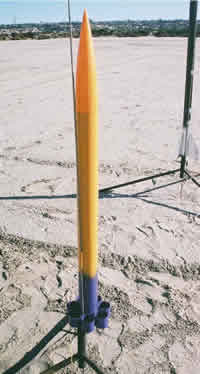
Brief:
Golden Acorn is a modification of the 3" "H-Pod XXL" I mentioned in my
March-April 2010 SPORT ROCKETRY article. It is a long-skinny version of the 7-tube tubefin "H-Pod" described
in an earlier EMRR construction article, differing only in being "non-stubby" (45 in. long) and having a 54mm
motor tube. After the surprise finding that 7-tube tube fins didn't need to be stubby to have a low drag coefficient
(Cd), I decided I would do a detailed comparison with some popular 3" I-J motor kits of "normal" rockets
to verify that I had made a tubefin that flew as efficiently as 3FNC designs. As part of of this, I wanted to try to
finally get a tubefin to fly as high from our sea-level desert launch site as the elevation of the "Golden Acorn
Casino" (4080' MSL) I drive past on the way to the SoCal desert. I succeeded (4,610' on a J210). Hence the name -
Golden Acorn.
Construction:
Golden Acorn is not so much a scratch design as it is a kit-bash from the new 3"
WIDOWMAKER tubefin kit from Discount Rocketry. Rather than buy components, I just replaced the six 3" diameter kit
tube fins with seven smaller tube fins cut from 54mm PML phenolic tubing (each 1 7/8" long), attached to the kit
34' body tube as described in the EMRR "H-Pod" article. The kit 29mm rings and motor tube was swapped for
54mm versions, and I upgraded to a 36" Top-Flite chute and 8' of3/16" para cord for the recovery system. The
shock cord was anchored through a hole 7" from
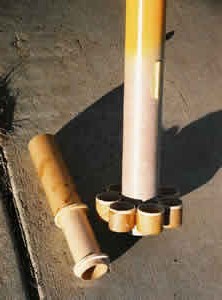 the
top of the body tube with a knot covered with epoxy and a plastic fairing (cut as usual from a plastic Garcia-Vega
cigar tube). Launch lug was a 2" piece of 5/16" brass tube centered 10" above the tube fin can and in
line with a triangular hole between two tube fins. Finish was orange and purple using Tamiya rattle-can. BTW, Jim at
Discount Rocketry says the shock cord can be attached right to the molded loop on the plastic cone with this kit, and
more than a dozen HPR flights with Golden Dragon, G to J, have proved him right - its rock solid, unlike the flimsy
loops on most plastic nose cones.
the
top of the body tube with a knot covered with epoxy and a plastic fairing (cut as usual from a plastic Garcia-Vega
cigar tube). Launch lug was a 2" piece of 5/16" brass tube centered 10" above the tube fin can and in
line with a triangular hole between two tube fins. Finish was orange and purple using Tamiya rattle-can. BTW, Jim at
Discount Rocketry says the shock cord can be attached right to the molded loop on the plastic cone with this kit, and
more than a dozen HPR flights with Golden Dragon, G to J, have proved him right - its rock solid, unlike the flimsy
loops on most plastic nose cones.
One thing I'd point out is the importance of sealing the leading edge of each tube fin against high speed air flow
to prevent delamination. I now seal the leading edge in every case if I'm going to fly more than 400 mph or so with a
simple wrap of 3/4" masking tape (photo); this is left in place and simply painted over. It works as well as
fiberglassing and is far less messy. You still need to reinforce the outer surface of each tube fin with a rectangle of
glass tape (see "H-Pod" article) to prevent flutter and landing dings.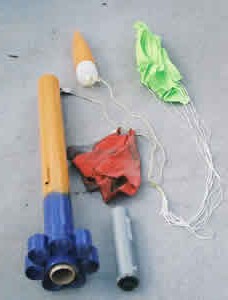
Flight:
First flight of Golden Acorn was on a Pro54 J210-10 to 4610' (measured with a Perfectflite
Alt15k in a taped-on Parasite Pod. Motor ejection at apogee, and,yes, it took me three hours to find it out in the
desert, finally located by a Daniel Greenan on his motorbike. Well, the hull has plenty of room for dual deployment
installation. Golden Acorn was also flown on the following motors/delays, to get a precise estimate of Cd at all
speeds: Pro54 I150BS-9, Pro38 I287SS-10, I212SS-9, I180SK-9, H153-8, H125-9, G185-5, G79SS-6, G78BS-8, G69SK-7 and
G50IM-6, Aerotech I161-10, H128-6 and G78-7G. Results summarized in the attached graph, showing average Cd=0.89, fairly
constant over the range 250-600 mph - what you'd expect for a "normal" 3FNC rocket, none of the severe
inverse speed dependence many tube fins display. I also obtained estimates of Cd for several popular 54mm 3" kit
rockets in the I-J range; these were obtained from the pages of EMRR reviews, where rocket weight, and altitude
achieved on specific motors was published, so I could back-calculate Cd using the www.markworld.com SIM freeware. The
"normal" 3" kit rockets used for comparison with Golden Acorn's Cd=0.89 were these (3-10 data points for
each kit):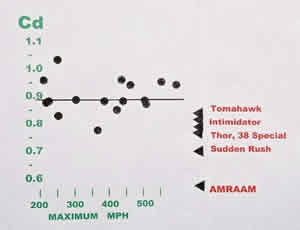
- PML D-Region Tomahawk avg. Cd=0.84 over range 400-600 mph
- BSD 38 Special avg. Cd=0.82 over range 300-600 mph
- Performance Intimidator avg. Cd=0.81 over range 300-450 mph
- BSD Thor avg. Cd=0.79 over range 300-650 mph
- PML Sudden Rush avg. Cd=0.70 over range 300-600 mph
- PML AMRAAM avg. Cd=0.59 over range 300-800 mph
The results for the reference kit rockets are summarized by the triangles representing average Cd in the graph
right margin.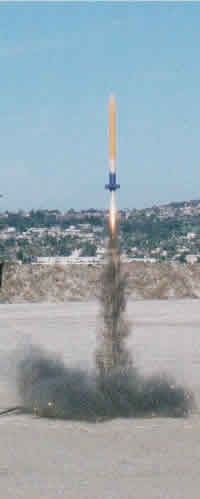
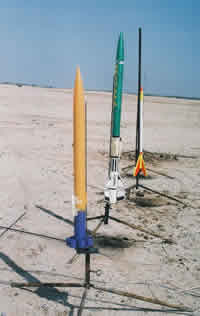
OK, so its clear from this that my "low Cd" tubefin is not exactly as good as any of the normal finned rockets. No surprise. But it came pretty darn close, Cd only 5% more than the PML Tomahawk, and only 10% more drag than the extremely popular split-fin 3" BSD Thor.
I was able to borrow a beautifully built and finished 3" BSD Thor for actual measurements (see photo with parasite pods on both rockets, and thank you, Todd Mullin), and got a measured Cd value of 0.80 at 342 mph, with a 2253' apogee on a Cesaroni I212SS-11; Golden Acorn on this same motor gave 2310' for Cd=0.88 at 509 mph. The lightweight Golden Acorn weighs less than half the weight of the solidly-built, Mach-capable Thor. Still, I'm claiming "similar" performance for my tubefin, as far as "fun value" goes. Put a J210 in either one, with motor ejection, and you are guaranteed a very long hike.
Recovery:
After more than a dozen flights, not a bit of damage to Golden Acorn, and perfect deployment
and recovery each time.
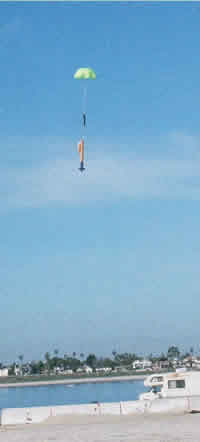 Summary:
Summary:
PROS: A 3" scratch tubefin with comparable performance to many top-quality
"normal" kit rockets, at a fraction of the cost and build time. Sturdy and durable, great wind resistance.
Easy to transport, no fins to break off. A very easy scratch build and L1-L2
 capable, flies on G-H-I-J motors (I'm sure an F50-4 would fly it, too).
capable, flies on G-H-I-J motors (I'm sure an F50-4 would fly it, too).
No need for thru-the-wall complexity. Unique tubefin looks.
CONS: Forget all the "cons" of tube fins (well, except the "looks" part if you don't like tube fins). Limited to the low-Newton "J" like J210 or J90, flying at less than 600 mph, or you'll tear it apart. Few 54mm motors are suitable.
No dual deployment, but there's room to built it in if desired.
 |
 |